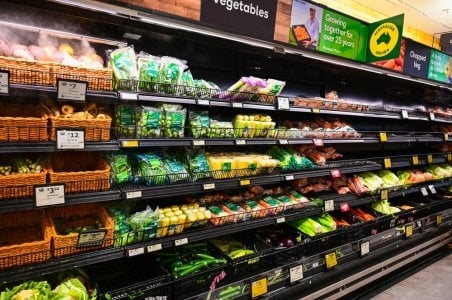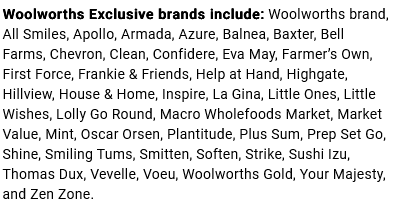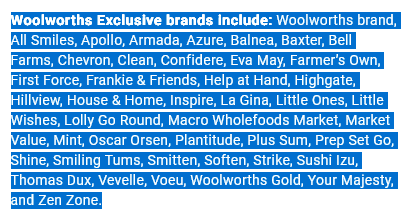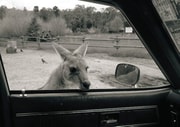Mystery brands quietly invade shelves as supermarkets create this stealthy move
By
Seia Ibanez
- Replies 23
In the bustling aisles of your local supermarket, a quiet transformation is taking place.
Products that seem familiar yet are strangely unaffiliated with the big-name brands we've grown to trust are sneaking onto shelves.
These 'phantom brands', as they've come to be known, are the supermarket's stealthy approach to capturing more of the market without drawing attention to their own label origins.
Phantom brands are essentially products owned by supermarket chains but designed to look like they're from independent companies.
They often have attractive packaging and competitive pricing, but they make no mention of being supermarket-owned.

Gary Mortimer, a retail researcher from the Queensland University of Technology, discussed this phenomenon with 2GB's Chris O'Keefe.
‘When you think about certain products you buy from the supermarket, things like baby food, dog food, shampoos or hand sanitisers, you don't particularly want to have a Coles or Woolworths or IGA brand plastered across it,’ he said.
Mortimer added that home brands have traditionally been associated with lower quality, forcing supermarkets to find a middle ground.
‘You'll still have your Coke, your Arnott's Tim Tam, Cadbury,’ he said.
‘The big brands are never going to disappear, you'll have your plain generic brand – your supermarket brand—and another brand that sits in the middle.’
The introduction of ALDI to the Australian market has been a game-changer. ALDI doesn't sell products branded with its own name.
Instead, it offers phantom brands such as 'Belmont' ice cream, 'Radiance' cleaning products, and 'Lacura' skincare.
‘They've improved the quality, ALDI has certainly legitimised private labelling in Australia. It's forced other players to lift their game,’ Mortimer said.
‘When you think about eggs and breads, they're not really being shipped in from anywhere, they're made from the same producers in Australia.’
ALDI's success with private labelling has forced other supermarkets to up their game, leading to an increase in the quality and presentation of their own-brand products.
In 2016, Woolworths launched its range of phantom brands, and Coles followed in 2020 with brands like 'Wild Tides' tuna and 'KOI' toiletries.
 Have you noticed these phantom brands in your local supermarket? Do you feel they offer good value, or do you prefer to stick with the brands you know? Share your experiences and insights in the comments below!
Have you noticed these phantom brands in your local supermarket? Do you feel they offer good value, or do you prefer to stick with the brands you know? Share your experiences and insights in the comments below!
Products that seem familiar yet are strangely unaffiliated with the big-name brands we've grown to trust are sneaking onto shelves.
These 'phantom brands', as they've come to be known, are the supermarket's stealthy approach to capturing more of the market without drawing attention to their own label origins.
Phantom brands are essentially products owned by supermarket chains but designed to look like they're from independent companies.
They often have attractive packaging and competitive pricing, but they make no mention of being supermarket-owned.

Supermarkets are revamping their home brand products with their ‘phantom brands’. Credit: Shutterstock
Gary Mortimer, a retail researcher from the Queensland University of Technology, discussed this phenomenon with 2GB's Chris O'Keefe.
‘When you think about certain products you buy from the supermarket, things like baby food, dog food, shampoos or hand sanitisers, you don't particularly want to have a Coles or Woolworths or IGA brand plastered across it,’ he said.
Mortimer added that home brands have traditionally been associated with lower quality, forcing supermarkets to find a middle ground.
‘You'll still have your Coke, your Arnott's Tim Tam, Cadbury,’ he said.
‘The big brands are never going to disappear, you'll have your plain generic brand – your supermarket brand—and another brand that sits in the middle.’
The introduction of ALDI to the Australian market has been a game-changer. ALDI doesn't sell products branded with its own name.
Instead, it offers phantom brands such as 'Belmont' ice cream, 'Radiance' cleaning products, and 'Lacura' skincare.
‘They've improved the quality, ALDI has certainly legitimised private labelling in Australia. It's forced other players to lift their game,’ Mortimer said.
‘When you think about eggs and breads, they're not really being shipped in from anywhere, they're made from the same producers in Australia.’
ALDI's success with private labelling has forced other supermarkets to up their game, leading to an increase in the quality and presentation of their own-brand products.
In 2016, Woolworths launched its range of phantom brands, and Coles followed in 2020 with brands like 'Wild Tides' tuna and 'KOI' toiletries.
Key Takeaways
- Australian supermarkets are introducing 'phantom brands' with packaging that omits any clear indication of being supermarket-owned.
- These brands, which often resemble private labels, are produced under licence for supermarkets and are strategically designed to fill a middle market.
- Retail expert Gary Mortimer highlighted the impact of Aldi on the Australian market, leading other supermarkets like Coles and Woolworths to improve their home brand strategies.
- ALDI has notably traded in phantom brands without using 'ALDI' branding, influencing other retailers to adopt similar practices for products ranging from food to toiletries.










